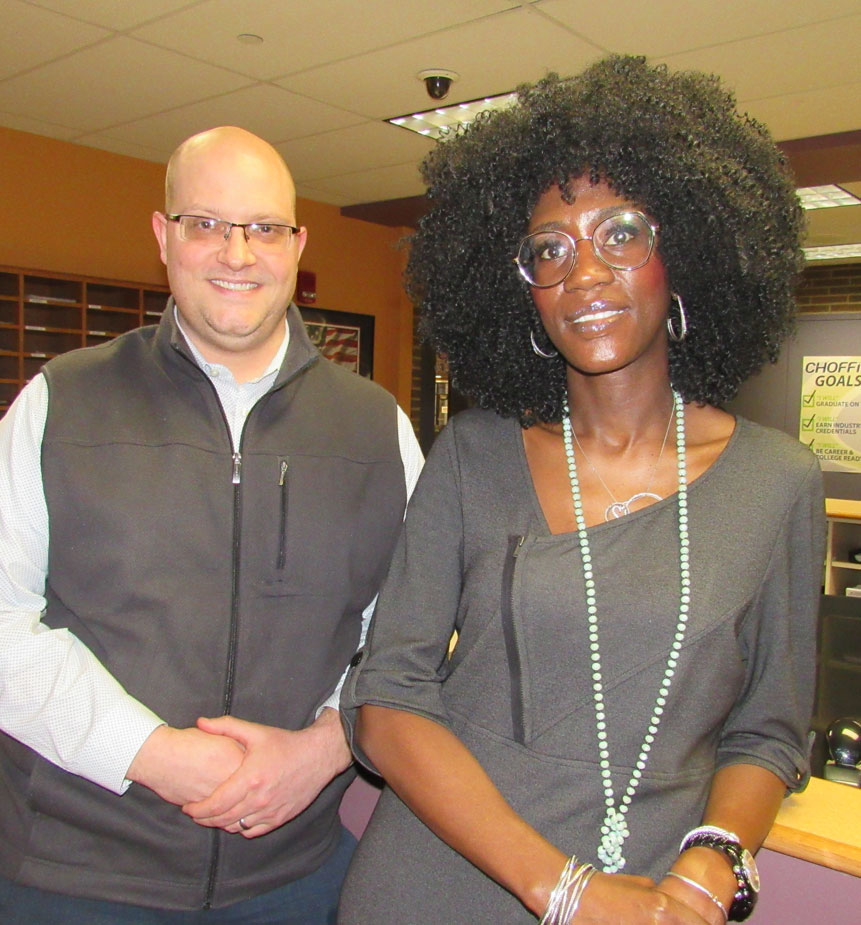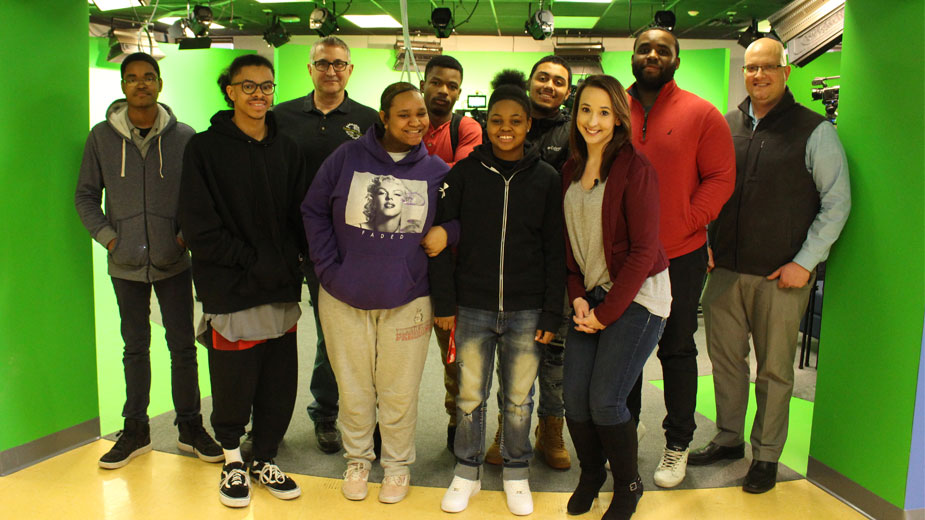YOUNGSTOWN, Ohio — After five years working in career and technical education in Rockford, Ill., Mike Saville has seen the effect such education can have on urban students.
Now, as one of three principals at Choffin Career & Technical Center, Youngstown, Saville looks to create as many employment and entrepreneurship opportunities for students as possible. The public career-tech school provides an alternative path to a diploma for students who attend Chaney and East high schools.
Saville says he sees a strong work ethic among the students and an “internal drive,” despite facing issues related to poverty that suburban students typically don’t face.
“Once you give them the tools for entrepreneurship and opportunities and a lit path, there’s nothing that’s going to stop that kid,” he says.
To provide that path, Choffin is putting greater emphasis on work placement and entrepreneurship. The school is building industry connections while increasing the rigor of its curriculum in an effort to graduate “impressive” students, he says.
Industry partners help define what the “impressive” standard looks like, and Choffin will reverse engineer its curriculum based on that, Saville says. It will touch all aspects of the school, including its administration, programs, students, partnerships and staff.
Currently, student success is measured by 10 standards – the most important being employability skills, or soft skills, he says. Those skills differ in each of the 15 programs Choffin offers, but some are standard throughout, including writing a resume and communicating professionally.
“We try to communicate those across the board and take students who are typically not brought up that way to have a strong understanding of why it’s important,” he says.
Since taking over Choffin in 2018, Saville is seeing these efforts pay off in higher rates of graduation. Last year, the school’s four-year graduation rate improved to 97.3%, up from 86.3% in 2018, he says. This year, the school is on track to increase that rate to 98.3%.
The curriculum is ideal for students who are more hands-on learners and struggle as test takers but still have all of their credits and are ready to graduate, Saville says. They can earn a diploma by receiving an industry credential through Choffin’s WebXam testing, which is specific to the student’s discipline.
“It’s based in auto tech if they’re an auto student or welding if they’re a welding student,” he says. “It’s very specific to an industry.”
This year, Choffin is working with industry partners to provide work placement and job-shadow opportunities for students in their senior year. The welding program, for example, works with the unions and employers to find placement opportunities.
Other partners include the Youngstown Business Incubator, Youngstown Metropolitan Housing Authority and Windsor House Inc.
Although Choffin doesn’t offer nursing programs for high school students, there are jobs within Windsor House for which they can be trained. These include housekeeping, maintenance, laundry and dietary, says the company’s civic affairs coordinator, Marc Masternick.
“A lot of the programs that Choffin offers line up with the things that Windsor House does or needs to do for the betterment of our residents,” Masternick says. “We’re working with Choffin, trying to help the students realize that there are opportunities in Youngstown and the Mahoning Valley, so you don’t have to leave for employment.”
Those experiences are important for urban students – particularly those who don’t have family members who have gone to college – because to them career-tech is relevant, says Bridget Lambright, principal at Choffin. For 22 years, Lambright worked in the Cleveland Heights-University Heights School District and has a background in career-tech education, which she calls “the silver bullet” for helping inner city students find success.
“They see their parents going to work every single day and developing a skill set,” she says. “And sometimes for kids who don’t have that college legacy, they can’t see college because they don’t have a point of reference. But everybody knows work.”

That relevance is important when keeping urban students motivated. “They don’t like to do stuff that they feel is a waste of their time,” she says.
Whether those students stay here or leave is unknown, she says, but “a majority tend to stay if we give them what they need. And they pass that onto their children, so they create a legacy of work.”
Students can enroll in Choffin their junior and senior years. They spend half the school day at Choffin in a work-based learning program and the other half at their home school working on academics. Students may earn as many credentials as they can in that two-year period.
And more students are graduating with those industry-recognized credentials, Saville says. In 2018, Choffin’s Prepared for Success rate – the percentage of students who graduate with a credential – was at 5.8%. Last year, it increased to 89.7%. The school is on track to increase that number to 94% this year, he says.
“We’re raising our rigor so high that we’re having industry credentials be an incoming requirement when they first get here,” he says. “We’re doing what we can that’s achievable in the first year, and it’s all employment-based stuff that is recognized as a credential.”
Each student earns OSHA, CPR and first aid credentials, as well as a credential through the National Incident Management System. While those credentials aren’t necessarily required for employment, the processes students go through to earn them are “beneficial for the ‘bigger than self’ concept that we’re trying to build,” he says.
In addition to employability, Saville wants to give students the tools necessary to start their own businesses in the community. One way Choffin looks to do that is through a barbering program.
A barber who opens a shop with five seats owns one of them and can rent the other four. “You’re making money on top of making money,” Saville says.
The program will focus on the business aspect while students earn a barbering license at Beyond Expectations Barber College in Youngstown. Students will spend three days each week at Beyond Expectations and “the other two days they’ll be here learning about business,” he says. Of the 90 students who voiced interest in the program, 30 have applied. “So we have almost a full program at this point.”
The school is looking for an instructor to teach the new business classes, among them strategic entrepreneurship, business administration, strategic management, operations management and management principles. The instructor must have experience and success in business, entrepreneurship and marketing.
Another program that offers both employability and entrepreneurship opportunities is interactive app and game development, he says.
Curriculum focuses on game design, programming, 3D art and animation, says instructor Don Hileman. In just one year, program enrollment increased to 30 from eight, he says.
In addition to classroom space with computers, the adjoining lab includes gaming consoles for Choffin’s new e-sports team that can be used for educational purposes, as well as virtual reality equipment, which will be heavily used in programming next year, he says.
“Our students are going to be creating content that you can actually physically walk around in a virtual reality world,” Hileman says.
Students build a portfolio of work they can either take to college or to an employer, he says. The program makes students employable worldwide because “you aren’t bound by your local market” and can work remotely, he says.
“We’re one of the few industries where that’s possible,” he says. “Our job market now for our students is worldwide. Companies in Russia, in Sweden, they’ll outsource their work to developers across the nation.”
Through Hileman’s contacts in the gaming industry, he spoke with representatives at Xbox to make the Choffin program an official Xbox developer program. Choffin received a special code to unlock an Xbox console in the lab so students can program games on the computers and send them to the console for testing, he says.
“They can also build and launch on Xbox Live,” he says, giving students a sense of entrepreneurship.
Once they have the training, there’s nothing stopping students from starting their own game and app development companies, he says. Using his own company as an example, Hileman started Enyx Studios with one computer out of his of his house, and within a year and a half had seven employees and closed a Series A investment round that resulted in the company being valued at $1.25 million.
“They could do the exact same thing,” Hileman says.
Offering new programs such as Interactive App and Game Design as well as Media Arts allows Choffin to stand out from other career-tech schools in the area, Saville says. With open enrollment, students could go to other career-tech schools in the Mahoning Valley, but “this is the career center for Youngstown kids,” he says.
“So we have an obligation to make this the best place to give students who have a disadvantage off the bat the best situation that they could possibly have for a career center,” he says. “We don’t want basic programs. We can get those anywhere. I want to see our kids outshine every single kid in a career-tech setting and beyond. My goal is to beat [Mahoning County Career and Technical Center].”
Enrollment at Choffin is about 175 to 190 students annually, although more than 300 were interested this year, Saville says. He would like to expand and introduce more programming, but that requires funding.
While the school relies on federal dollars through the Carl D. Perkins Career and Technical Education Act of 2006 to fund much of its work, there is a freeze on funding for career-technical education at the state level for fiscal 2020 and 2021. He hopes that will be relaxed in the next year or two.
“When the state’s pushing career and tech [education] as much as they are, I think that’s a reasonable request,” he says.
Pictured above: Students and faculty at Choffin Career and Technical Center hosted an open house March 4 at the new studio for the media arts program launched this year. Eight construction technology seniors designed and built the new studio. Front row, from left: Kevin Jusino, senior, Paris Riggins, senior, India Smith, senior, Cristen Manion, photojournalism instructor. Back row: Malique Fields, senior, Kevin Sinkele, construction technology instructor, Marshall Herron, senior, Reynaldo Torres Aquirre, senior, Noah Daniels Wilder, videography and journalism instructor, and Mike Saville, principal.
